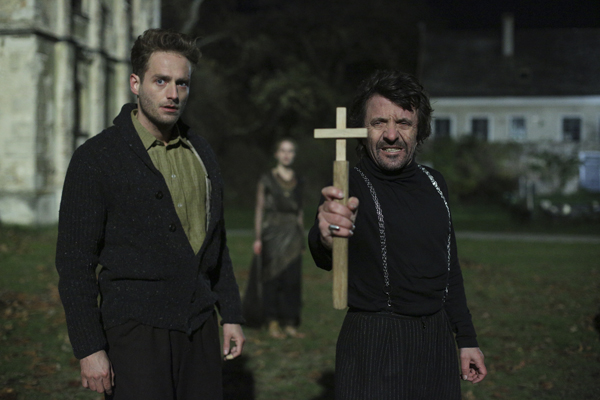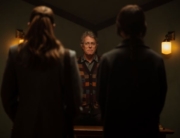Therapy for a Vampire is a clunky title for this charming, clever German comedy. For one, the therapy sessions are minimal and are only used as a springboard to kick off the plot, which is appropriately reminiscent of a 1930’s farce, given that the film is set in Vienna, 1932.
Count Geza von Közsnöm (a deliciously low-key Tobias Moretti) requests and receives therapy from none other than Sigmund Freud. Apparently the Count suffers from ennui. He is unhappy with his centuries-long marriage to Countess Elsa (Jeannette Hain). He longs for his first love, Nadila, who was unfortunately torched and burned centuries ago. Meanwhile, the bloodthirsty, vicious, and vain Countess Elsa hasn’t seen herself in centuries, and is desperate to believe she is still beautiful. There is an excellent scene where she powder puffs her face in front of a mirror, desperately attempting to eke out a line or contour of her long unseen visage.
Meanwhile, a young artist, Viktor (Dominic Oley), is employed by Freud to sketch out some dreams of the doctor’s patients for an upcoming book. He happens to show Freud a painting of his girlfriend, Lucy (Cornelia Ivancan), and laments how he loves her but she is too modern for his taste. (She prefers trousers to dresses). During one of the Count’s sessions, the aristocratic vampire sees Viktor’s painting. It is an exact replica and probable reincarnation of his beloved Nadila, and he decides to seduce Lucy.
If one feels that I have given away too much plot just now, rest assured that this all occurs in the first 25 minutes. After that, writer/director David Ruehm leans back and lets it rip in the classiest, most low-key way possible. This is actually a romantic farce masquerading as a horror/comedy, and Ruehm’s touch is light and dry as a lovely sauvignon blanc. He never pushes, while establishing a tone of wry bemusement throughout. Beneath it all is a fable of vanity and empowerment: vanity for the vampires who are, understandably, self-involved and selfish, and empowerment in the form of Lucy, the object du jour for the men and an obstacle to be eliminated for Countess Elsa. Lucy moves from the sideline to the film’s center as she pushes through the men’s need to categorize her to their image. How that is done is somehow surprising and inevitable and damn funny.
And poor Freud (a droll Karl Fischer). As these lovelorn lunatics keep circling back to him for advice, he is too wrapped up in himself and his theories (vanity again) to realize there are actual supernatural beings afoot.
So, if you are looking for a delightful, little bon mot of a film and can stand some (not much) cartoonish blood and guts, Therapy may be for you.







Leave A Comment